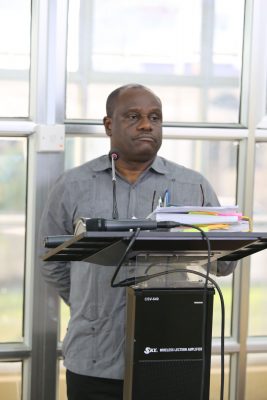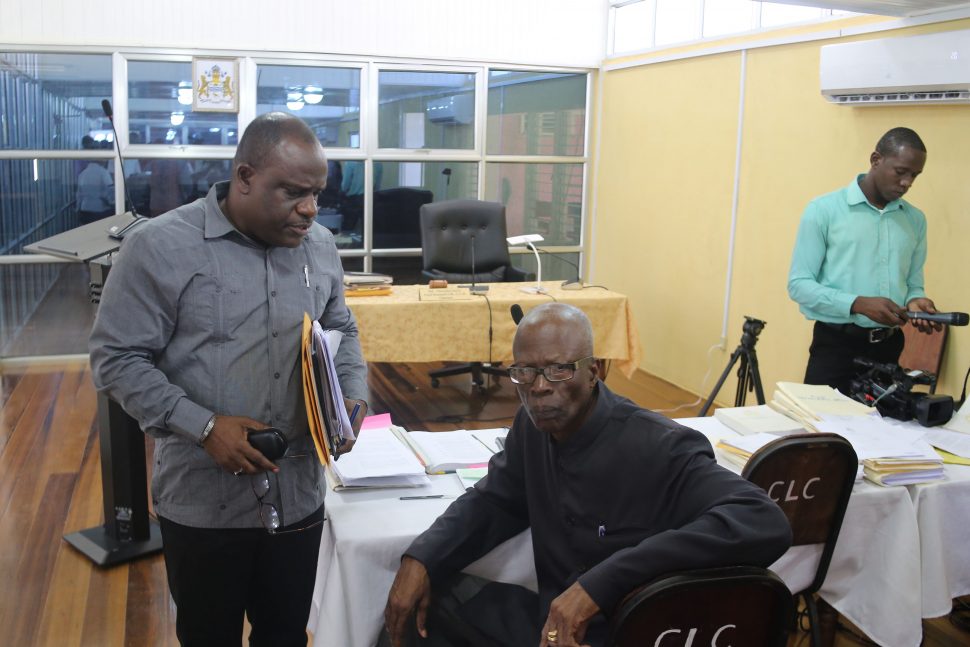Following an unsuccessful challenge to the legality of the Commission of Inquiry (CoI) into the operations of City Hall, Town Clerk Royston King yesterday began facing questions and submitted evidence to support the legality of his actions when he leased the Sussex Street wharf claimed by NICIL to a shipping company.
The highly anticipated testimony of King, who was sent on leave to facilitate the probe, was delayed by several hours after his lawyer, Maxwell Edwards, challenged both the fairness and legality of the CoI.
Just after 3 pm, retired judge Cecil Kennard, who is Chairman of the Commission, ruled that the CoI was “properly set up” and King finally took the stand for brief questioning.
Apart from brief testimony before it was adjourned until Friday, King submitted an affidavit to the CoI indicating that his appearance was “under protest” and “without prejudice” to his rights to insist on strict compliance with the Eighth Schedule (paragraph 1) of the Municipal and District Councils Act, which argues that the Local Government Commission (LGC) “shall specify the terms of reference (ToR) of the inquiry.”

In this regard, King maintained that the ToR, as published in the Official Gazette of September 22nd, 2018, is specific to only two issues—namely, the manner with which the council dealt with the no-confidence motion brought against him and the rental of wharf and facilities at Mudflat 1 Lombard Street, which is being claimed by the National Industrial and Commercial Investments Limited (NICIL).
Consequently, he responded to these two specific issues. In relation to the former, he noted that though he had the discretion to omit from the agenda the no-confidence motion, he did not. Instead, he said he sought and obtained written legal advice and the motion was placed on the agenda and dealt with accordingly by the Council.
Based on the advice presented by King, the motion was disallowed. Kennard noted on Friday that Mayor Patricia Chase-Green erred in allowing King to present the advice from his personal lawyer, which guided the council’s voting to disallow the hearing of the motion brought by former Deputy Mayors Sherod Duncan and Lionel Jaikaran, both of the AFC.
City property
Meanwhile, in relation to the wharf, King provided the commission with copies of a transport, No. 2803 of 1966, which shows that the then Mayor and Town Council of Georgetown had full and absolute title to the riparian lands abutting and contiguous to the foreshore at Mudflat 1 Lombard Street.
Additionally, King provided a copy of a lease, dated 1958, between the then Mayor and Town Council of Georgetown and the Colony of British Guiana, which granted the colony use of the land for the purpose of carrying on a Fish Centre for 10 years at a rental of 24 cents per annum.
He also noted that in 1995, a lease agreement was signed between M&CC and the Georgetown and International Fishing Investment Company Limited. A copy of this lease, filed as No. 132/99 with the Deeds Registry, was also provided to the commission.
In fact, King alleged that he has personally searched and caused the staff of Parliament Office to search for the Order vesting ownership of the piece of land at Lombard and Sussex Streets in the Guyana Marketing Corporation (GMC) but could find none.
The said order 97 of 1963 could not be found thus King has concluded that “the reasonable and irresistible inference is that no notice was published and accordingly that property never vested in or passed to GMC which therefore was incapable of passing transporting to anyone.”
NICIL had previously told the commission that the land is transported to Guyana National Engineering Corporation Limited (GNEC) via Land Transport #525 of 1985.
Arianne McLean, in-house attorney for NICIL, testified that GNEC acquired the property in 1985, after purchasing it from the GMC. Subsequent to this acquisition, NICIL acquired the property when GNEC was dissolved, and all of its assets and liabilities were handed over to NICIL via a vesting order, dated May 30th, 2002.
The vesting order, McLean maintained, listed the property as the first asset on the vesting order.
However, King, in his affidavit, maintained that in leasing the Sussex Street Wharf to private company Quick Shipping he acted in “the honest and genuine belief that [he] was acting in and for the best interest of the cash strapped City Council in respect of its property that was not being beneficially utilized since 2011; nor earning it any revenue whatsoever.”
He stressed that alternatively council has been in sole and undisturbed possession, use and enjoyment of the property for the statutory period of 30 years prior to 2011, thereby extinguishing the title of government and accordingly acquiring prescriptive title under the provisions of the Title to Land Act.
Legal authority
Earlier, Edwards had argued that while Section 14 of the LGC Act grants the LGC the power to conduct inquiries in line with those conducted under the Commission of Inquiry Act, this power is granted solely to the “commission” and it was not vested with the power to establish a CoI separate from itself.
Further, he argued that while Section 19 of the LGC Act grants the commission the right to delegate its functions, it is only allowed to delegate to “any local government authority,” which the CoI is not.
Kennard, however, argued that one has to consider the purpose of the LGC Act, which was to give certain powers to the LGC, including the right to investigate complaints at the local government level.
He added that in cases of such a magnitude, where the commission does not have the “competence to investigate the matter… it demands that the enquiry be conducted by trained legal persons rather than laypersons.”
Kennard repeatedly stressed the “magnitude” of the investigation and concluded that in interpreting legislation, one must apply a commonsense approach to the situation, which would show that in setting up the CoI the LGC acted commendably.
Once he took the stand, King was briefly questioned before his testimony was adjourned until Friday morning.
The brief questioning King underwent focused on the conditions under which the council’s records were being kept at the dilapidated Constabulary Training School.
“As Town Clerk, I am painfully aware of the poor storage of municipal records,” King testified.
He indicated that one of the projects he implemented during the 20 years he was the Public Relations Officer engaged personnel from the National Archives to upgrade the Municipal Archives at the training complex by, among other things, fumigating and working to preserve records
“We were unable to sustain because of a lack of resources, both financial and human,” King told the CoI before noting that this year he applied to the council for permission to set up a documentation centre, which will accommodate the municipal archives, the municipal library and an ICT Centre. He further noted that council is currently considering whether to repair the training complex or lease or rent the complex to a private company.
King was not questioned about claims made at council and to the Audit office of Guyana that the council has within the last few years spent in excess of $19 million on rehabilitation work at the complex.






